Ljubljana related
STA, 12 August 2019 - More than 60 real estate agencies asked the Constitutional Court on Monday to review a recently adopted bill that limits commission fees for leasing real estate and other costs which real estate agencies can charge their clients.
According to Boštjan Udovič from the Chamber of Commerce and Industry (GZS), the 66 agencies involved want the top court to review and stay provisions limiting service commissions.
They argue the bill encroaches on the right to engage in free enterprise and the right to property, meaning it also violates the European Convention on Human Rights as well as EU law.
"The legislator failed to demonstrate any public benefit that would justify such an intervention in the rights of the plaintiffs. The goals allegedly pursued are general and have to do with housing policy and not with property brokerage," Udovič told the STA.
The legislative changes, originally passed on 11 July and again a week later following a National Council veto, entered in to force on 10 August and protect tenants against paying commissions for services provided by a real estate agency which was hired by the landlord.
They also introduced cap on commissions that can be charged by apartment rental agencies; the capped amount corresponds to one monthly rent, but should not go lower than 150 euro.
Where did you live before Slovenia, and what brought you here?
Before Slovenia, my husband and I were living in London. Despite both of us working in the city, we always had a hand in property development. In 2004, when many countries joined the EU, we started looking at our options to invest aboard. We stumbled across Slovenia on a map and were mesmerized by its locations. We knew straight away this would be a great place to have a vacation home as its proximity to all the other countries and small size made getting away relatively easy. This was going to be our base camp for many adventures. Little did we know at the time that we would call this place home for the next 12 years.
A television interview with Jade van Baaren
How did you start looking for work here, and what was that experience like?
I think I came here with an idea of what I would do, but this quickly changed. I think that you have to be willing to be flexible and find what the country lacks and what you can offer. I have noticed with a few people that I know that they also came here with big ideas of what would work, but soon found out that they had to do a bit if soul searching and work hard to make a go of it here.
What’s your business, and how long have you been running it?
I am a renovation project manager and also run JVB Designworks. A company that consists of architects and design consultants. We run projects from start to finish for our clients, offering full renovations and design with a turnkey finish.
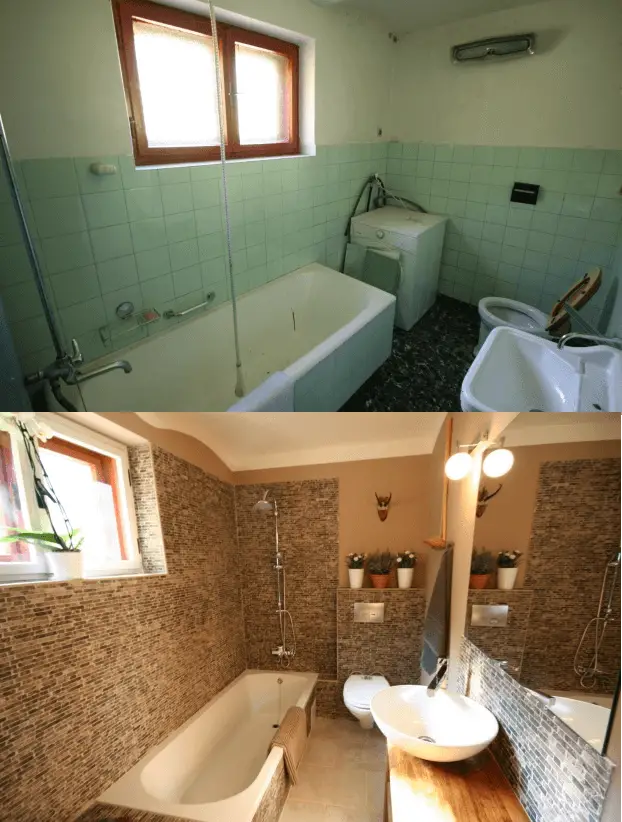
What was your experience of starting a business here?
Like any new business it was a lot of hard work with a strong learning curve. I had to get the right people in the right place for it all to run smoothly. Now, after many years, we are reaching this point. However, in the construction and design business you will always encounter challenges, but that’s what I love about the job.
What kind of problems can you help people solve?
After many years in the business I have a lot of knowledge, not just of construction and design issues, but also in finding out who the client is and what they are really looking to get out of the project. Most of my projects are for the rental market, so I also have to know what the market is wanting, expecting and needs. Many of our projects are in idyllic but remote spots in Slovenia. These can be the most breathtaking places to relax and enjoy nature in all its grandeur, but can also be the most challenging spots for construction, electrical works, plumbing and water.
So most of my projects come with challenges, but for me it’s like an unsolved puzzle. There is always a solution, the trick is to approach problems from many different angles.
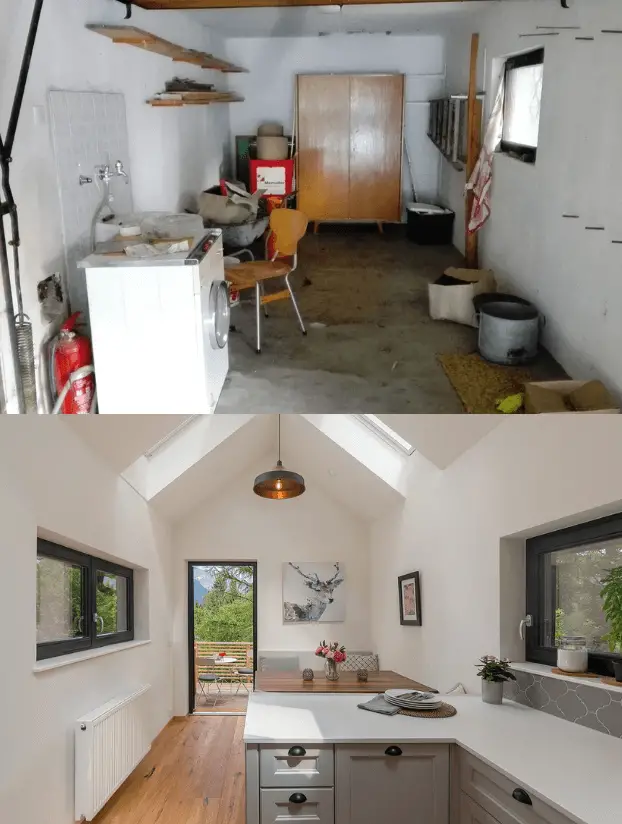
How are you qualified to solve these problems?
It takes a big team to solve all these problems, and I can say that I have throughout the years found the best people in their fields to help us solve various issues. I’ve been working in Slovenia on renovations for 12 years now, starting with our own place when we first moved here. I have architects, engineers and construction specialist, all part of the JVB Designworks team who play a role in the problem-solving process. However, I think my own many years working and living in so many different countries have given me the ability to see things from many different angles, and I would say that problem solving is one of my biggest strengths.
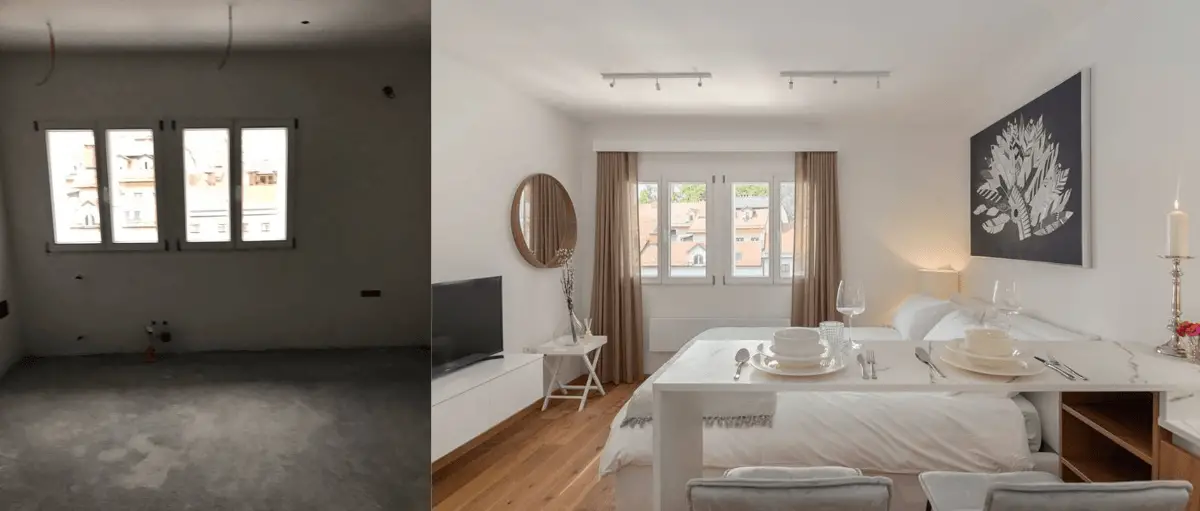
How has the business changed over the years, and what are your plans for the future?
Well it’s grown, that would be the biggest change so far. More clients investing in Slovenia are now interested in restoring older properties, which is my specialty.
With regard to the future, I have lots of ideas in the pipeline that are not ready to be shown yet, but I’m always just looking to run things more efficiently, keeping up with the latest eco-technology so these places can run better and be more affordable. And always getting to know the rental market better.
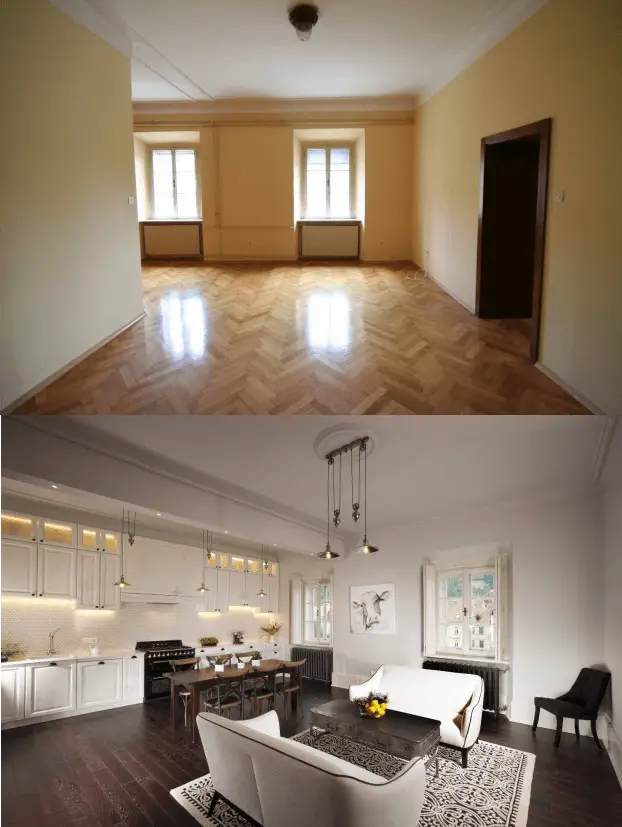
Where can people find out more about your work?
My Facebook page has all my latest and greatest projects. I like to often show off these magical places I get to work in and the fun side of renovations. We love before and after pictures, as the transformations is huge. It’s hard to keep this up on my website, so Facebook is the best place to view all current projects.
What was your experience of culture shock in Slovenia?
It was very hard at first to live here. I found that the people where naturally suspicious of our intentions. Slovenian’s are very family oriented, and as an outsider it is very hard to break into social circles. Coming from a vibrant city like London, where we had a big social scene with lots going on, and then moving here where we had little interaction with anyone – I think that was the biggest shock for me, and something I didn’t think about when moving here. I have moved many times in my life, more than most, and never came across such a closed culture.
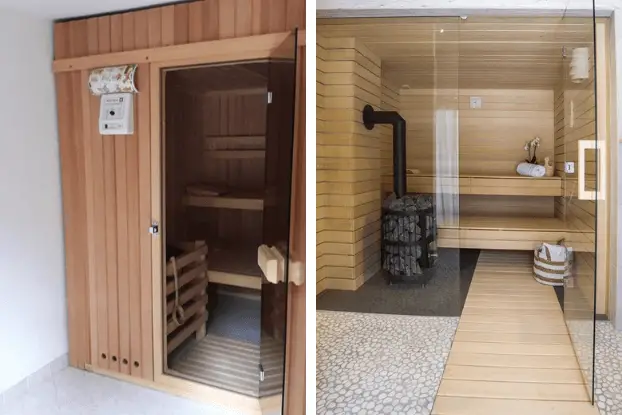
What are some things from Slovenia that you think your home country could benefit from?
I think Slovenians approach to conservation and environmental issues is something that a lot of countries could befit from. It is true that Slovenia is a small place, and this can be a benefit when implementing environmental measures. They love the outdoors and have great respect for nature.
And what are some thing from your home country that you think Slovenia could benefit from?
I would like to see the Slovenians have a bit more of an open mind and be more trusting, as I think this is just a better way to live.
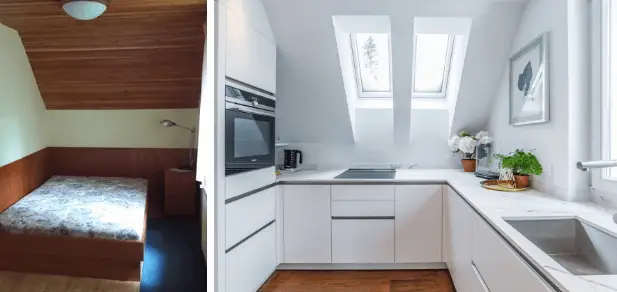
Have you learned Slovene?
This is a touchy subject. I have been trying to learn Slovenia for years. I have taken courses, but to be honest starting and running my business and having a family have taken priority. If it came easy that would be another story, but It does not, and I would have to spend a lot of time to perfect it. I can get by but it’s very basic.
What things frustrate you about life in Slovenia?
I kind of love to call it SLOWvenia. In contrast to places like NYC and London, were life runs at a very fast pace and its expected to have immediate results, things just move at a different pace here, a slower pace. That used to frustrate me, but after 12 years I have adapted to this way of life, almost.
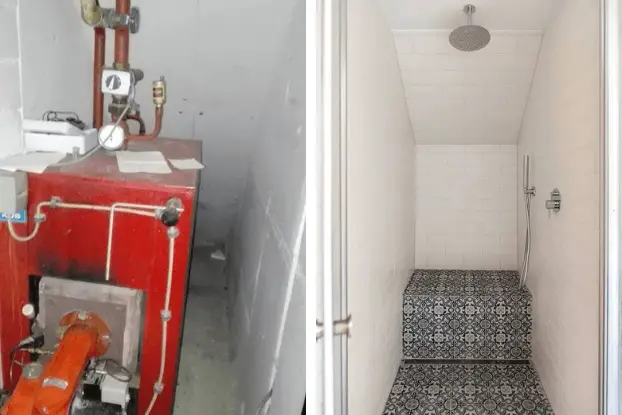
What things delight you?
The quality of life for my children. I know they are in the best place in the world for growing up, growing up, learning values and most of all they are in a safe environment
Do you think you’ll stay in Slovenia for the rest of your life?
Well I would never say that about any place due to my history. But so far I’ve lived longer in Slovenia than anywhere else.
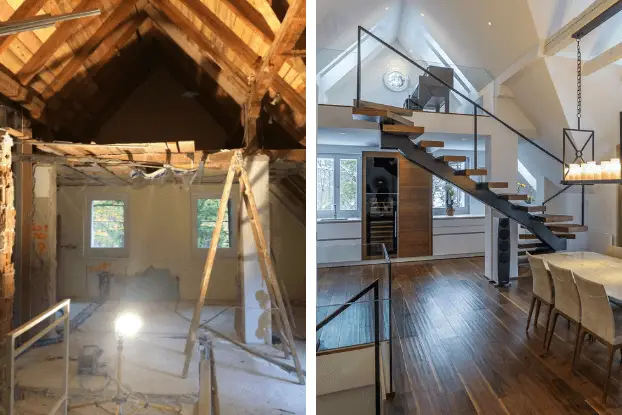
Would you advise a friend to move to Slovenia?
Not if you’re young, when you should go out and be pushed around by the big players, get experience, be challenged, work hard. Then come here and raise a family. Be a big fish in a small pond.
What do you wish someone had told you before you moved here?
Nothing, or else I don’t think I would have come if I’d known how difficult it was going to be. Many times, we almost packed it in. I would say the first six years I was very close to jumping on a plane and getting out of here. But now I am doing what I love, and my family is happy and healthy.
As well as the links throughout this story, you can see more of Jade and her team’s work at JVB Designwork’s website.
STA, 15 July 2019 - A bill to limit commission fees for leasing real estate and other costs which real estate agencies can charge their clients was vetoed by the National Council on Monday.
The veto comes as real estate agencies have vehemently protested the bill and have threatened to petition the Constitutional Court.
Under the changes to the act on real estate agency tabled by the Left, landlords would fully pay the commission fee charged by a real estate agency for a service commissioned by them.
This means tenants would no longer shoulder part of the fee, tackling one of the biggest complaints by individuals - the fact that tenants pay a fee for a service they have not commissioned.
A cap would also be imposed on the commission fee that can be charged by apartment rental agencies to landlords. The capped amount would correspond to one monthly rent but would not be lower than 150 euros.
The restrictions apply only to rental to individuals, business-to-business transactions are exempted.
Councillor Mitja Gorenšček, who led the veto initiative, argued today that the proponents of regulation should be targeting other fields on the market and not an area that the average persons encounters once or never in their life.
The Left's Luka Mesec begged to differ, arguing Slovenia had not developed a long-term flat renting market, with most tenants signing 12-month contracts and then being forced to pay for a service they did not commission every few years.
While the Left argued one of the goals of the bill was to enable people affordable housing, Gorenšček said the real problem was insufficient supply and that this was where the state should intervene with measures. He however also echoed the claims of businesses that the bill was an encroachment on the free market.
Environmental and Spatial Planning Ministry State Secretary Marko Maver however also came out in the defence of the bill, saying it followed housing policy guideline. He said it would increase accessibility and also encourage long-term contracts.
Meanwhile, the bill also introduces EU rules in acquiring qualifications for a real estate agent; Slovenia had already received a warning about a delay from the European Commission.
The Left is confident the bill receive the absolute majority needed in the National Assembly to override the veto.
All our stories on property in Slovenia are here
STA, 12 July 2019 - A bill to limit commission fees for leasing real estate and other costs which real estate agencies can charge their clients was endorsed by the National Assembly on Friday amidst protests by real estate agencies, which have threatened to petition the Constitutional Court.
Under the changes to the act on real estate agency tabled by the Left, landlords would fully pay the commission fee charged by a real estate agency for a service commissioned by them.
This means tenants would no longer shoulder part of the fee, tackling one of the biggest complaints by individuals - the fact that tenants pay a fee for a service they have not commissioned.
A cap would also be imposed on the commission fee that can be charged by apartment rental agencies to landlords. The capped amount would correspond to one monthly rent but would not be lower than 150 euros.
The restrictions apply only to rental to individuals, business-to-business transactions are exempted.
The Left believes tenants in apartments leased at market prices should benefit the most since they will no longer have to pay commission fees for the services they have not commissioned and since landlords would be encouraged to rent out their apartments for longer periods.
The bill also introduces EU rules in acquiring qualifications for a real estate agent; Slovenia had already received a warning about a delay from the European Commission.
While the motion received wholehearted support from the government and the Consumer Protection Association, businesses have been up in arms over what they say is encroachment on the free market.
Representatives of real estate agents, who even took out whole-page ads in newspapers to protest the bill, said it was inadmissible for anyone to limit the price of a service available on the free market.
The Chamber of Commerce and Industry (GZS) has said there is enough competition on the market and citizens are not obliged to use this service.
Fewer than 50% of real estate transactions are made through real estate agents, which GZS sees as proof that tenants are not forced to shoulder the commission fee for the service.
The GZS's section of real estate agents has said it will report Slovenia to the European Commission and probably ask the Constitutional Court to review the bill.
STA, 1 July 219 - A bill to limit commission fees for renting real estate and other costs which real estate agencies can charge their clients, was endorsed at committee level on Monday, although MPs from left and right were reserved about limiting "business initiative". The cabinet supports the opposition-sponsored bill, but realtors are outraged.
The Left, which supports the minority government, filed the changes to the law on real estate agencies in June to improve the status of tenants but also landlords.
Under the changes, landlords would fully pay the commission fee charged by a real estate agency for a service commissioned by them.
This means tenants would no longer shoulder part of the fee, which the Left deems fair, since they have to pay a down payment and the rent.
A cap would also be imposed on the commission fee that can be charged by apartment rental agencies to landlords. The capped amount would correspond to one monthly rent, but would not go lower than 150 euro.
The Left believes tenants in apartments rented out at market prices should benefit the most since they will no longer have to pay commission fees for the services they have not commissioned and since landlords would be encouraged to rent out their apartments for longer periods.
The bill also introduce EU rules in acquiring qualifications for a real estate agent. As Left leader Luka Mesec told the Infrastructure, Environment and Spatial Planning Committee, Slovenia had already received a warning about a delay from the European Commission.
State Secretary at the Ministry of the Environment and Spatial Planning Aleš Prijon said the bill was in line with the government's housing policy, especially in that it protected tenants.
A similar view was expressed by the Consumer Protection Association, whose Jana Turk said it improved consumer protection in the rental market.
On the other hand, representatives of real estate agents find it unimaginable that anyone would limit the price of a service available on the free market.
Boštjan Udovič from the Chamber of Commerce and Industry (GZS) said there was enough competition on the market and citizens were obliged to use this service.
He said that less than 50% of the deals were made through real estate agents, which showed tenants were not forced to shoulder the commission fee for the service.
If the bill is passed, the GZS's chamber of real estate business will report Slovenia to the European Commission and probably ask the Constitutional Court to review it, he announced.
All our stories on real estate are here
STA, 21 June 2019 - Slovenian home prices grew at an average rate of 0.8% in the first quarter of the year and were up 8.9% on the year before, a sign that rapid price growth is slowing but at a very sluggish pace, show Statistics Office data released on Friday.
The rates are lower than in previous quarters, when annual prices grew at double-digit rates, as the shortage of housing that has lasted for years after the crisis slowly eases with the arrival of new developments on the market.
The prices of second-hand homes, which account for the vast majority of all transactions, rose by 0.9% over the previous quarter and by 9.9% annually.
Used flats were up 8.9% annually and 1.3% at the quarterly level, while houses were almost a percent cheaper than in the previous quarter, even as their prices surged by 12.4% annually.
The prices of new homes, meanwhile, rose by 6.9% at the annual level and declined by 1% over the previous quarter.
Apartments were 9% more expensive than in the previous quarter, but the prices declined by half a percent year-on-year. House prices were up 3.3% over the previous quarter and a percent more expensive than in the same period last year.
All our stories on real estate in Slovenia are here, while our propert of the week stories are here
STA, 12 June 2019 - In a bid to improve the status of tenants but also landlords, the opposition Left (Levica) has filed a bill to limit commissions for renting real estate and costs which real estate agencies can charge to their clients.
The changes to the law on real estate agencies, which bring commission limits similar to those in place for real estate sales, were submitted to parliament on Wednesday, the Left said in today's press release.
Tenants would no longer have to pay commissions for services provided by a real estate agency which was hired by the landlord.
Landlords would benefit from a cap on commissions that can be charged by apartment rental agencies; the capped amount would correspond to one monthly rent, but would not go lower than 150 euro.
The Left believes tenants in apartments rented out at market prices should benefit the most since they will no longer have to pay commission for the services they have not commissioned and since landlords would be encouraged to rent out their apartments for longer periods.
MP Matej T. Vatovec said the bill was harmonised with the Ministry of the Environment and Spatial Planning and endorsed by coalition representatives, so the Left expected it to be passed in parliament.
However, even if such changes are set down in a deal between the government coalition and the opposition party which supports the government, coalition MPs did not contribute their signatures.
"The coalition's decision to support the bill or not [in parliament] will show whether it is serious about cooperation with the Left, and will also serve as the basis to decide how to proceed cooperation-wise," Vatovec was quoted in the release as saying.
STA, 10 June 2019 - After a two-year dispute on the sale of land for the planned Tobačna City development in Ljubljana, the Higher Court has ruled that the owner of a tiny part of the land will be able to buy the entire complex as the holder of the pre-emptive right.
The decision of the Ljubljana Higher Court to grant an appeal by Igor Pezdirc, who owns parts of two out of the total of 49 plots at the location of a former cigarette plant, was published on Monday by AJPES, the agency for public legal records.
The ruling follows the April decision of the Constitutional Court that Pezdirc may exercise his pre-emptive right, as violation of this right would represent an encroachment of the right to private property.
The complex just south-east of Tivoli Park is slated to be transformed into a housing and commercial development, but the project has been stalled due to a dispute in the sale of the land from the bankruptcy estate of a failed developer.
The huge development was sold by the administrator of the bankrupt builder Imos-G to the Austrian company EWO - Bauträger for EUR 25m in July 2018, but just before the transaction could be finalised, Pezdirc stepped forward to annul the deal.
The deal fell through as Pezdirc exercised the pre-emptive right and the administrator concluded a contract with him, which was later contested in court.
The court of first instance decided that Pezdirc cannot exercise the pre-emptive right on all remaining land plots of the complex, which was upheld by the Higher Court. Pezdirc then filed an appeal at the Constitutional Court.
The Constitutional Court ordered the Higher Court to take a new decision in the case, and the latter now allowed Imos-G to sign a contract with Pezdirc.
Along with the Austrian company and Pezdirc, also bidding for Tobačna City was the Ljubljana-based builder KPL, owned by the Bosnian company MG Mind, which had unsuccessfully initiated court proceedings against the original sale to EWO - Bauträger.
In the new decision, the Higher Court rejected the arguments by EWO - Bauträger and KPL, including that Pezdirc does not have enough money to buy the complex and that he only stands for another buyer.
His lawyer Marko Zaman has rejected the suspicion that Pezdirc does not have enough money by noting that he had already paid a deposit.
As for media speculations that Montenegrin businessman Alen Sijarić stands behind him, Zaman said that the pre-emptive right was not transferable, while Pezdirc was not prohibited from selling the land later on.
STA, 15 May 2019 - The National Council, the upper chamber of parliament, is spearheading a new attempt to help several thousand people who took out mortgages in Swiss francs and ran into trouble when the Swiss central bank stopped protecting the value of the currency in 2015.
It adopted on Wednesday a bill that would make it obligatory for banks to convert all Swiss franc loans to euro at the exchange rate valid at the time the loan agreement was signed.
The new loan agreement would bear interest applicable to euro loans at the time of the original loan agreement, and borrowers would be entitled to get back any excess payments they have already made.
The bill would apply to all Swiss franc loans made between 28 June 2004 and 31 December 2010, including those that have already been fully paid up.
The legislation, which will now have to be examined by the lower chamber of parliament, is substantively the same as a bill proposed by Franc Association, a group lobbying for Swiss franc borrowers, in December 2017.
That bill automatically expired when the new parliament was inaugurated in 2018, with franc borrowers counting on the new parliament being more susceptible to their proposal and enlisting the National Council to help get the legislation into parliamentary procedure.
The new government indicated in late-2018 it was willing to tackle the issue, with the caveat that it would try to seek a different solution than the one proposed by franc borrowers.
The original bill had been strongly criticised by banks, which want the issue resolved on a case-by-case basis rather than with a sweeping systemic law.
It has also come under fire from the European Central Bank, which expressed serious concerns about its retroactive character and effects on the banking sector.
Slovenian courts have so far delivered mixed verdicts in claims brought by borrowers, substantively revolving around whether consumers had the necessary information about risks when they took out loans.
But the Supreme Court appeared to have set a general course for future lower-court rulings with two verdicts in late-2018 that respectively determined that consumer protection rules at that time were more lax, and that banks had sufficiently explained the risks.
At least one case has already made it to the Constitutional Court, which is yet to deliver its verdict.
STA, 13 May 2019 - The National Assembly passed on Monday legislative changes delaying the next round of mass property appraisal for about a year. Under the government-proposed changes, the appraisal will be completed by the end of March 2020 and not the end of July 2019, as initially planned.
The delay was deemed necessary by the government to allow more time to find consensus about what sort of appraisal model to use in the future.
To allow the extension and prolong the validity of the current system, the government drafted changes to the act on mass appraisal of real estate and the real estate records act, with the National Assembly passing them today.
Slovenia introduced the real estate appraisal system in 2006. After the Constitutional Court raised an issue with parts of the legislation in 2013, it was amended at the beginning of 2018.
The changes define the system more closely and stipulate ways in which the values can be used for tax purposes. The changes also allow the public to participate in the creation of valuation models and allow appeals by owners.
Finance Ministry State Secretary Natalija Kovač Jereb told the MPs before the vote that the government wanted to reach a high level of acceptance of mass appraisal and want to dedicate more time talking to experts and municipalities.
In autumn, a trial appraisal will be conducted and appraisal models will be presented and the final models will take into account the comments from the public.
Coalition parties supported the delay, while the opposition, including the minority government's partner, the Left, expressed disagreement with the delay.
The Democrats (SDS) said that the government had not presented sufficient concrete reasons for the delay, adding that the original legislation must have been drafted poorly.
All our stories on property in Slovenia are here





